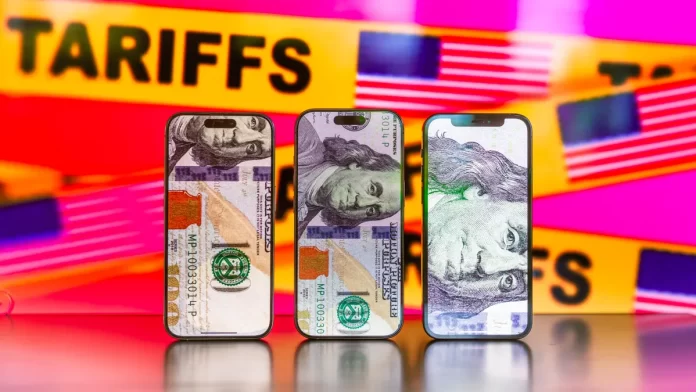Wall Street Cheers, Silicon Valley Workers Fear As Trump Backs Off Tariffs & Big Tech Cashes In
In a dramatic policy reversal, the Trump administration announced late Friday it would exempt smartphones, laptops, and other consumer electronics from sweeping tariffs—sidestepping what could’ve been a pricing disaster for both tech companies and consumers. Devices like iPhones, hard drives, chips, and flat-panel monitors won’t be subject to the 145% tariffs on Chinese goods or the 10% baseline for other countries, per U.S. Customs and Border Protection.
The decision immediately sent ripples through the market, with analysts predicting a rally led by Apple and Nvidia when the U.S. stock market reopens Monday. Apple, which still manufactures its flagship devices in China, was seen as particularly vulnerable. “A huge black cloud has been lifted off the tech sector,” said Wedbush analyst Dan Ives.
Why the White House Flinched on Tariffs
Behind the scenes, the exemption underscores the administration’s quiet recognition that its trade war tactics aren’t moving the needle on domestic tech manufacturing. Apple’s decades-deep supply chain in China isn’t something that can be uprooted overnight—or even over a few years—without massive cost increases that would make iPhones triple in price and tank sales. A U.S.-based production shift may be a political talking point, but in reality, it’s a logistical fantasy in the short term.
That’s why, for the second time during Trump’s presidency, electronics got a hall pass. But this time around, it followed a steep tumble in tech stock value, with the so-called “Magnificent Seven”—Apple, Microsoft, Nvidia, Amazon, Tesla, Alphabet, and Meta—losing $2.1 trillion combined in value after the new tariffs were first unveiled on April 2. Though some of those losses eased after a partial pause earlier this week, Friday’s exemption signals a full retreat on electronics—at least for now.
Tech Executives Cozy Up as Workers Brace for Impact
This tariff reprieve is exactly the kind of treatment Big Tech had been banking on when leaders like Tim Cook, Elon Musk, Sundar Pichai, Mark Zuckerberg, and Jeff Bezos stood behind Trump during his January 20 inauguration. Their public show of loyalty was a strategic move—betting that the new administration would be more accommodating than Biden’s.
That bet appears to be paying off. Apple recently pledged $500 billion in U.S. investments and 20,000 jobs, echoing its earlier $350 billion promise during Trump’s first term when iPhones were also granted tariff exemptions.
But while the boardrooms may be celebrating, the mood on the ground in Silicon Valley tells a very different story.
A Growing Divide Between Tech Leaders and Their Workforce
As tech billionaires shift further to the right—funding campaigns, filling White House roles, and adopting authoritarian rhetoric—many of their employees are feeling betrayed, fearful, and politically disconnected. “The trust is broken,” said Kamal Ali, an AI developer. “A lot of employees are very upset by what’s going on. It’s going to be different forever.”
The ideological divide between tech executives and their workforces is growing. While Trump fills advisory roles with venture capitalists and crypto tycoons, everyday tech workers are protesting his agenda. Thousands showed up at rallies across Silicon Valley last weekend, including a packed demonstration in downtown San Jose. The fear wasn’t just about politics—it was about power, surveillance, and the erosion of democracy.
“Just coming here, everyone’s saying turn off the facial recognition on your phone,” said Dianne Wood, a startup employee. “We’re all scared.”
Silicon Valley’s Identity Crisis
The tech industry used to pride itself on progress—startups that wanted to “change the world” and companies that branded themselves as ethical disruptors. But the rise of crypto, AI, and billion-dollar egos has turned that mission inward. “Now, if you’re part of a startup, you’re hoping you’ll be absorbed in a way that’s profitable,” said Jan English-Lueck, a San Jose State professor who has tracked the culture of Silicon Valley for over two decades.
That cultural shift, combined with layoffs, surveillance concerns, and growing inequality, has left workers disillusioned. “The money is all shifting to the wealthiest, and that terrifies me,” Wood said. “Unfortunately, you’ve got the Zuckerbergs and Elon Musks of the world who are taking that over.”
What It Means for the Future of Tech
For everyday people, the tariff reversal means no immediate spike in smartphone or laptop prices. But for the industry’s workforce, it’s a red flag. The Trump administration’s public courting of tech giants—even while hinting at pressure for onshore manufacturing—raises serious questions about who benefits from this “new era” of tech policy.
This isn’t just a shift in trade—it’s a shift in power, in politics, and in who gets a say in shaping the future. While Wall Street may cheer Monday’s rebound, Silicon Valley’s workers are left wondering: at what cost?








